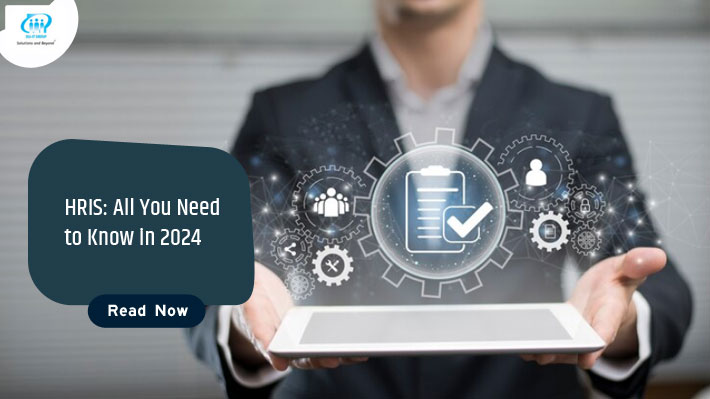These days, dynamic business operations require strong human resource management, which can be a key to the organisation’s prosperity.
When we are now in 2024, the impact of Human Resource Information Systems (HRIS) cannot be underestimated. Similar to HRMS, HRIS can be regarded as a solution developed to assist companies in smoothly running their HR processes.
This blog focuses on HRIS and its advantages for your business in 2024.
What is an HRIS?
HRIS is an HR-integrated system that brings the different human resources functions together into a single database. It is one important way of managing staff data, tracking performance, administering benefits and maintaining compliance with labour laws.
Through the consolidation of HR-related data and HR processes, HRIS facilitates organisational effectiveness, lowers administrative tasks, and promotes data-driven decision-making.
Key Features of an HRIS
Modern HRIS solutions provide a set of capabilities that can fully support the complex realm of organisations. Some of the most notable features of an HRIS are:
- Employee Database Management:
Centralised data warehousing and management of employee records, which contain personal information, job details and performance appraisals.
- Recruitment and Onboarding:
Improvement of hiring procedures, starting with job posting, and applicant tracking to onboarding new employees.
- Time and Attendance Tracking:
Automatic attendance tracking, leave management and payroll processing.
- Performance Management:
Enabling the review process, goal setting and professional development plans to be in place.
- Benefits Administration:
Effective oversight of employee benefits such as health insurance, retirement programs and fitness initiatives.
Advantages of Implementing an HRIS in 2024
In light of the rapid move into the digital age, the benefits of implementing an HRIS are getting clearer and clearer. Here are some key advantages that organisations can expect:
- Streamlined HR Processes
Through the process of automation and centralization, HRIS eliminates manual data input, reduces paperwork, and lowers the chance of mistakes. This not only improves efficiency but also allows HR professionals to spend more time on strategic projects.
- Improved Data Accuracy and Accessibility
With an HRIS, employee data is securely stored in a centralised database; hence, consistent data and the possibility of redundant or inaccurate information are reduced. Besides that, individuals with the required authorization can get hold of this data from anywhere and hence better decision-making and collaboration are attained.
- Enhanced Compliance and Risk Mitigation
The task of staying up-to-date with fast-changing labour laws and regulations can be tough. An HRIS facilitates compliance with automatic alerts, tracking mechanisms, and reporting tools in place, which helps organisations mitigate risks and avoid significant penalties.
- Better Employee Experience
With the use of an HRIS, an employee acquires self-service portals that enable him/her to manage personal information, and participate in performance reviews, among other things. It not only increases employee participation but also decreases the administrative work of HR teams.
- Data-Driven Decision-Making
An HRIS enables organisations to take advantage of the reporting and analytical power that can eventually help discover HR-related trends, output, and improvement areas. This provides decision-makers with data-driven evidence to base their strategies on.
How to Choose the Right HRIS in 2024?
With the abundance of HRIS on the market, the choice of the right solution for your company may be overwhelming. Here are some key factors to consider when evaluating HRIS options in 2024:
- Scalability and Flexibility
As your business continues to expand and evolve, so should its HRIS to provide more and higher standards of service. Search for solutions that can be scaled up and adapted easily to enable integration with other systems, as well as features for customisation.
- UI/UX and Ease of Use
The interface must be user-friendly so that a high level of implementation by employees and HR professionals is achieved. Focus on those solutions that deliver a smooth progression across different devices and platforms.
- Efficient Security and Data Safety
Today, data privacy and security issues have risen, so your HRIS needs to be well-updated with the existing industry rules and regulations. Evaluate the security measures that are used like encryption, access controls and data backup and recovery procedures.
- Integration Capabilities
The HRIS you need today must integrate with other apps and software, be it HR and payroll software, which are part of business functions. Make sure that the proposed solution will provide you with the ability to avoid the creation of data silos and facilitate operational efficiency.
Conclusion
In 2024, the HRIS will no longer be a “nice to have” tool for businesses but rather a necessity. It is a tool that helps an organisation to get its HR processes fully optimized, to have better relations with their employees and to have better business strategies.
The application of HRIS assists in streamlining and empowering the workforce. With the right HRIS, you can set your organisation up for success in 2024 and beyond.
To know more you can contact us at info@dli-it.com
